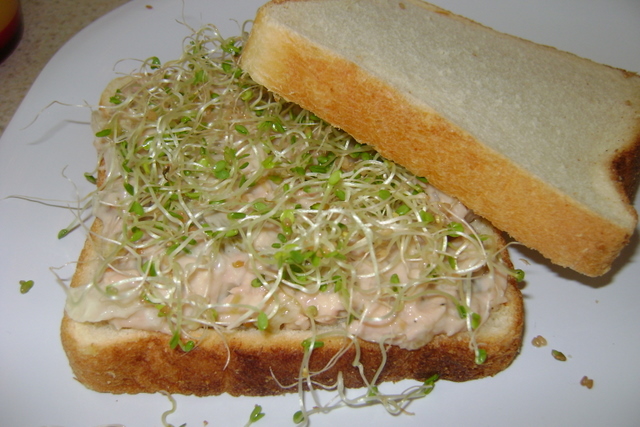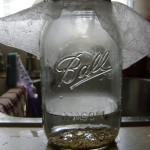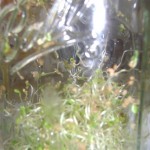Mung bean and alfalfa are probably the best known of all the edible sprouts, but there is quite a variety of seeds that are good for sprouting. The list of possiblities is so long that I will only share the ones I have heard of. Some spice and herb seeds that can be sprouted are anise, basil, celery, chives, cilatntro, dill, fennel, mustard and sesame. Among the beans and peas are navy, chickpeas, green lentils, blackeyed peas, and snow peas. One thing to keep in mind is that most of the larger beans are considered inedible because of the possiblity of toxins, how difficult they are to digest, and mainly because they taste terrible. Among those are kidney, lima, and black beans. Almonds are the only nut I know of that can be eaten as sprouts, but there are quite a few grains, including barley, buckwheat, millet, oats, and flax (although flax is reportedly hard to sprout). Some others that are used are arugula, broccoli, cauliflower, cabbage, clover, garlic, hemp, and onion.
Sprouts are not a “super food”, but they do have protein, lipids (largely unsaturated), vitamins and minerals (such as phosphorous and zinc) and very little sugar. Mung beans are the most nutritious by weight, exceeding raw spinach.
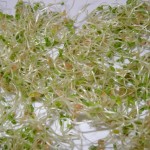
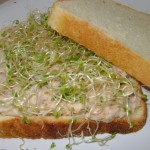 An easy and inexpensive way to get fresh sprouts year round is with a mason jar and a lid that will strain. Seeds can be bought in bulk for very little. How many seeds you start with should be determined by how fast you will use them. We usually put in 2 to 4 tsp. and have a couple of jars going at 3 to 5 day intervals. This is enough for us to use on sandwiches and in salads several times a week. There shouldn’t be so many that they won’t fit in the jar after they sprout. After putting the seeds in the jar, cover with water (we use warm) and put on the strainer lid. We usually use cheesecloth and a mason jar ring, but sometimes use old clean pantyhose…and this time I am using an old dryer sheet that I washed very well). Then let it sit in a dark place for a day or two to soak. A cabinet works well. Next, drain and rinse the seeds, then drain again, shaking to remove all excess water and set them in indirect sunlight. Rinse once or twice a day until sprouts are done, then rinse and drain well (patting with a paper towel works well) and store in refrigerator in a ziploc bag or bowl with lid. They should keep quite a few days and if you have the jars growing at intervals, you will always have a fresh supply for sandwiches and salads.
An easy and inexpensive way to get fresh sprouts year round is with a mason jar and a lid that will strain. Seeds can be bought in bulk for very little. How many seeds you start with should be determined by how fast you will use them. We usually put in 2 to 4 tsp. and have a couple of jars going at 3 to 5 day intervals. This is enough for us to use on sandwiches and in salads several times a week. There shouldn’t be so many that they won’t fit in the jar after they sprout. After putting the seeds in the jar, cover with water (we use warm) and put on the strainer lid. We usually use cheesecloth and a mason jar ring, but sometimes use old clean pantyhose…and this time I am using an old dryer sheet that I washed very well). Then let it sit in a dark place for a day or two to soak. A cabinet works well. Next, drain and rinse the seeds, then drain again, shaking to remove all excess water and set them in indirect sunlight. Rinse once or twice a day until sprouts are done, then rinse and drain well (patting with a paper towel works well) and store in refrigerator in a ziploc bag or bowl with lid. They should keep quite a few days and if you have the jars growing at intervals, you will always have a fresh supply for sandwiches and salads.
